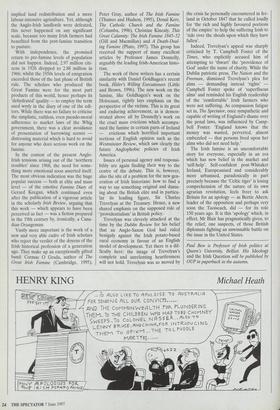ENGLAND'S WILLING EXECUTIONERS?
After Mr Blair's 'apology', Paul Bew explains the new historians' debate about the Great Famine
THE Irish historical debate about the Great Famine of 1845-50 — in which one million Irish people died, despite the expenditure of millions of pounds of British aid — is a rather curious one. In particular, how should the role of the British government be viewed? Forty years ago R. Dudley Edwards and T.D. Williams of University College, Dublin — in response to a proposal by Taoiseach Eamon De Valera — edited the first aca- demic history of the famine (The Great Famine: Studies in Irish History, Dublin, 1956).
The verdict finally arrived at in The Great Famine was a carefully wrought judgment: 'Human limitations and timidi- ty dominate the story of the Great Famine, but of great and deliberately imposed evil in high positions of responsi- bility there is little evidence. The really great evil lay in the totality of that social order which made such a famine possible and could tolerate, to the extent it did, the sufferings and hardship it caused by the failure of the potato crop.'
There is an echo here of one of the principal Irish school textbooks, Stephen Gwynn's The Student's History of Ireland (1925), which attacked British emotional distance but added, 'Yet, this has to be said. No native government could have prevented famine from follow- ing on a loss of the potato crop. The worst failure of government lay in allowing such a state of society to grow up as existed in 1845.'
When the famine actually was a living memory it was a painful, ambiguous one for those who lived in Ireland. There were many who effectively denounced the British government from the start, but all the political implications were not so clear- cut. In 1880, W.E. Forster was appointed Gladstone's Chief Secretary in Dublin. Forster struggled unavailingly with a new upsurge in nationalist agrarian radicalism; yet, as a young man, he had played a key role in the magnificent Quaker relief effort during the famine. In ironic contrast, the police records mutter darkly about promi- nent anti-government activists who bene- fited directly from the famine clearances or the post-famine transition to pasture in general.
From the foundation of the Irish Repub- lican Brotherhood in 1858, almost up to the transformative and modernising Whitaker Report of 1958, Irish national- ism was afflicted by a central contradic- tion: officially the most successful political movements — the Fenians, the Land League, the United Irish League, Sinn Fein and then Fianna Fail — were com- mitted to a policy of agrarian radicalism, 'undoing the work of the famine'. This implied land redistribution and a more labour-intensive agriculture. Yet, although the Anglo-Irish landlords were defeated, this never happened on any significant scale, because too many Irish farmers had benefited from the post-famine transition to pasture.
With independence, the promised return to pre-famine levels of population did not happen. Indeed, 2.97 million citi- zens in 1926 dropped to 2.88 million in 1966; whilst the 1950s levels of emigration exceeded those of the last phase of British rule. The scholars who produced the Great Famine were for the most part products of this world, hence perhaps its 'dehydrated' quality — to employ the term used wryly in the diary of one of the edi- tors. While there was no failure to criticise the simplistic, ruthless, even pseudo-moral adherence to market laws of the Whig government, there was a clear avoidance of presentation of harrowing scenes — distressing material which is hard to avoid for anyone who does serious work on the famine.
In the context of the present Anglo- Irish tensions arising out of the 'northern troubles' since 1968, the need for some- thing more emotional soon asserted itself. The most obvious indication was the huge popular success — both at elite and mass level — of the emotive Famine Diary of Gerard Keegan, which continued even after the publication of a vigorous article in the scholarly Irish Review, arguing that this work — which appears to have been perceived as fact — was a fiction prepared in the 19th century by, ironically, a Cana- dian Orangeman.
Vastly more important is the work of a new and very able cadre of Irish scholars who reject the verdict of the doyens of the Irish historical profession of a generation ago. They make up an exceptionally gifted band: Cormac 0 Grada, author of The Great Irish Famine (Cambridge, 1995), Peter Gray, author of The Irish Famine (Thames and Hudson, 1995), Donal Kerr, The Catholic Church and the Famine (Columba, 1996), Christine Kinealy, This Great Calamity: The Irish Famine 1845-52 (Gill and Macmillan) and A Death-Deal- ing Famine (Pluto, 1997). This group has received the support of many excellent articles by Professor James Donnelly, arguably the leading Irish-American histo- rian.
The work of these writers has a certain similarity with Daniel Goldhagen's recent book, Hitler's Willing Executioners (Little and Brown, 1996). The new work on the famine, like Goldhagen's work on the Holocaust, rightly lays emphasis on the perspective of the victims. This is its great and enduring achievement, as is demon- strated above all by Donnelly's work on the cruel mass evictions which accompa- nied the famine in certain parts of Ireland — evictions which horrified important sections of English opinion such as the Westminster Review, which saw clearly the future Anglophobic policies of Irish America.
Issues of personal agency and responsi- bility are again finding their way to the centre of the debate. This is, however, also the site of a problem for the new gen- eration of Irish historians: how to find a way to say something original and damn- ing about the British elite and in particu- lar its leading figure, Sir Charles Trevelyan at the Treasury. Hence, a new shared emphasis on the supposed role of `providentialism' in British policy.
Trevelyan was cleverly attacked at the time by the Dublin Review for his belief that an Anglo-Saxon God had ruled benignly against the Irish potato-based rural economy in favour of an English model of development. Yet there is a dif- ficulty here: the image of Trevelyan's complete and unrelenting heartlessness will not hold. Trevelyan was so moved by the crisis he personally encountered in Ire- land in October 1847 that he called loudly for 'the rich and highly favoured portions of the empire' to help the suffering Irish to 'tide over the shoals upon which they have fallen'.
Indeed, Trevelyan's appeal was sharply criticised by T. Campbell Foster of the Times, who explicitly accused him of attempting to 'thwart' the 'providence of God' under the name of charity. While the Dublin patriotic press, The Nation and the Freeman, dismissed Trevelyan's plea for alms — demanding instead 'rights' — Campbell Foster spoke of 'superfluous alms' and reminded his English readership of the 'comfortable' Irish farmers who were not suffering. As compassion fatigue set in, The Spectator, once sympathetic and capable of writing of England's shame over the penal laws, was influenced by Camp- bell Foster: 'England knows that the money was wasted, perverted, almost embezzled — that persons lived upon her alms who did not need help.'
The Irish famine is an uncomfortable story for everyone, especially in an era which has new belief in the market and 'self-help'. Self-confident post-Whitaker Ireland, Europeanised and considerably more urbanised, paradoxically in part precisely because the 'Celtic tiger' is losing comprehension of the nature of its own agrarian revolution, feels freer to ask Britain for an apology — as Bertie Ahern, leader of the opposition and perhaps very soon the Taoiseach, did — for its role 150 years ago. It is this 'apology' which, in effect, Mr Blair has pragmatically given, to the relief, one suspects, of those British diplomats fighting an unwinnable battle on the issue in the United States.
Paul Bew is Professor of Irish politics at Queen's University, Belfast. His Ideology and the Irish Question will be published by OUP in paperback in the autumn.











































































 Previous page
Previous page